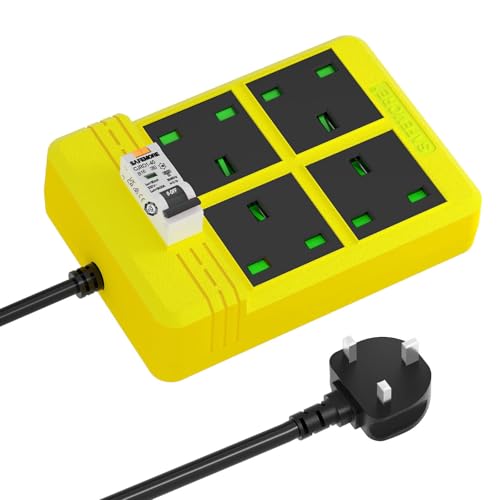




Many homeowners face the dilemma of where to place their washing machine, especially if space is limited inside the house. One option that often comes to mind is the garage. However, before moving your washing machine to the garage, it is important to consider the potential risks and challenges that may arise.
One of the main concerns with placing a washing machine in the garage is the temperature fluctuations. Garages are notorious for experiencing extreme temperatures, especially during the summer and winter months. These temperature changes can affect the performance and lifespan of your washing machine, potentially causing damage to its internal components.
Experts recommend ensuring that your garage is properly insulated and temperature-controlled if you plan to place a washing machine in it. This can help maintain a stable temperature and protect the machine from excessive heat or cold.
Another important factor to consider is the moisture level in the garage. Garages are often prone to dampness and humidity, which can be detrimental to a washing machine. Excessive moisture can lead to the growth of mold and mildew inside the machine, causing unpleasant smells and potential health hazards. Additionally, moisture can corrode the internal parts of the machine, leading to malfunctions and reduced efficiency.
Experts advise keeping the garage well-ventilated and using a dehumidifier if necessary to reduce moisture levels. It is also recommended to regularly clean and dry the washing machine to prevent the buildup of mold and mildew.
The Benefits of Having a Washing Machine in the Garage
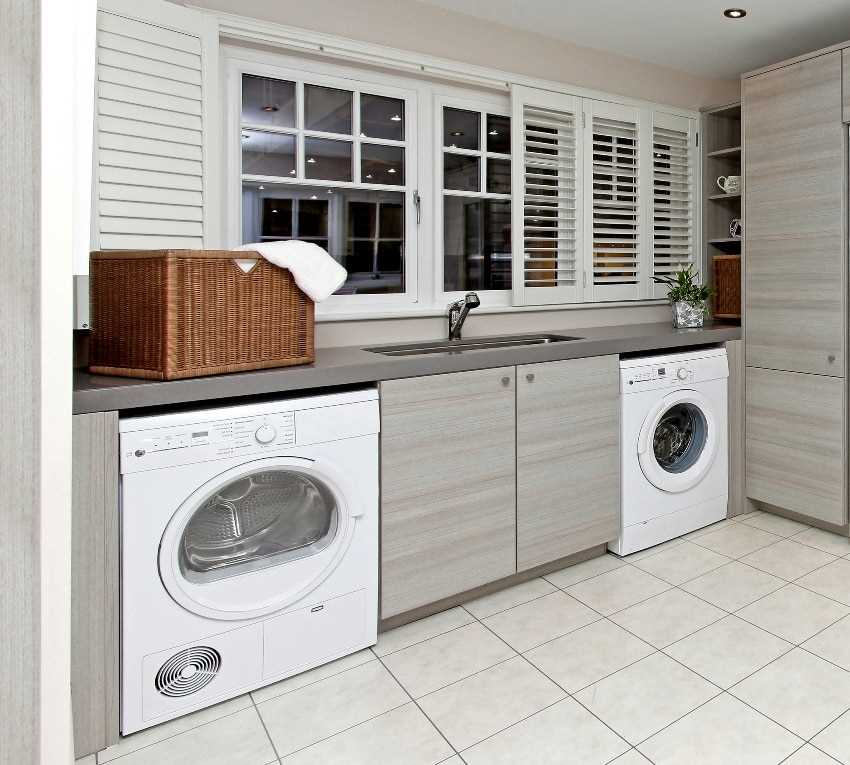
Having a washing machine in the garage offers several advantages for homeowners. Here are some of the benefits:
- Convenience: Placing a washing machine in the garage allows for easy access, especially when you are working in the garage or using it as a multipurpose space. You don’t have to go to a separate laundry room or basement every time you need to do laundry.
- Space-saving: If you have limited space inside your home, having a washing machine in the garage can help free up valuable square footage. This is particularly useful for small apartments or houses where every inch of space counts.
- Separate laundry area: The garage serves as a dedicated space for laundry, keeping it separate from the main living areas. This can help prevent noise and disturbance from the washing machine, especially if you have young children or you work from home.
- Flexibility: By having a washing machine in the garage, you have the flexibility to use the garage for other purposes, such as storage, a workshop, or a fitness area. You can easily convert the space back to a laundry area when needed, without any major renovations or disruptions.
- Outdoor clothing: If you frequently engage in outdoor activities or have children who play sports, having a washing machine in the garage makes it convenient to wash outdoor clothing and gear without bringing dirt and mud into the house.
- Easy maintenance: The garage typically has a concrete floor, which makes it easier to clean up any potential leaks or spills from the washing machine. Additionally, the garage is usually well-ventilated, reducing moisture buildup and potential mold growth.
In summary, putting a washing machine in the garage can offer convenience, space-saving, a separate laundry area, flexibility, easy cleaning, and the ability to wash outdoor clothing. Ultimately, it comes down to personal preference and the layout of your home.
Factors to Consider Before Placing a Washing Machine in the Garage
- Temperature and Humidity: The garage can experience extreme temperatures and humidity fluctuations, which can affect the performance and lifespan of a washing machine. It is important to ensure that the garage is insulated and properly ventilated to minimize these effects.
- Electrical Requirements: Check if the existing electrical system in the garage can support the power requirements of the washing machine. It is necessary to have a dedicated circuit and grounded outlet to prevent electrical issues.
- Water Supply and Drainage: Ensure that there is a water supply and proper drainage system available in the garage. If not, you may need to install additional plumbing connections to facilitate the use of a washing machine.
- Space: Measure the available space in the garage to determine if it can accommodate a washing machine. Consider the dimensions of the machine and leave enough room for easy access and ventilation.
- Noise and Vibration: Washing machines can produce noise and vibration during operation. If the garage is in close proximity to living spaces or bedrooms, consider the noise levels produced by the machine and take measures to soundproof the area.
- Garage Use: Consider how the garage is used and if placing a washing machine in the space will interfere with its primary function. Evaluate if there is enough room for both vehicle parking and the washing machine.
- Maintenance: Garages can be dusty and prone to pests, which can impact the performance of a washing machine. Regular cleaning and maintenance should be considered to ensure optimal functioning.
Tips for Installing and Using a Washing Machine in the Garage
1. Placement and Preparation
When installing a washing machine in the garage, it’s important to choose the right location. Ensure that the area you select has proper ventilation and drainage. You may need to install a floor drain or use a bucket to collect the water that drains from the machine.
If the garage is not temperature-controlled, it’s essential to protect the washing machine from extreme heat or cold. Consider insulating the garage or installing a heater or air conditioner to maintain a suitable temperature.
2. Leveling the Machine
Properly leveling the washing machine is crucial for optimum performance and to avoid excessive noise and vibration. Use a spirit level to check if the machine is balanced and adjust the feet accordingly to ensure it sits level on the floor. This will also prevent the machine from walking or moving during the spin cycle.
3. Adequate Power Supply
Make sure that the garage has the necessary electrical supply to accommodate the washing machine. Check the washer’s voltage and ensure that the electrical outlet in the garage can handle the load. It may be necessary to have an electrician install a dedicated circuit for the machine.
4. Protecting the Machine

Garages can be dusty and prone to moisture, which can negatively affect the performance and lifespan of your washing machine. Consider using a washing machine cover to protect it from dust, dirt, and potential water damage. Additionally, regularly cleaning the machine’s filters and draining any excess water can help maintain its efficiency.
5. Use the Recommended Detergent
When using a washing machine in the garage, it’s essential to follow the manufacturer’s instructions and use the recommended detergent. Some detergents may not work well in certain temperature conditions or water hardness levels, which can affect your washing machine’s performance.
6. Regular Maintenance
Just like any other appliance, your washing machine requires regular maintenance to ensure optimal performance. Regularly clean the machine’s drum, lint filter, and detergent dispenser to prevent the buildup of dirt and debris. Check the hoses for any leaks or cracks and replace them if necessary. Keeping up with routine maintenance tasks will help prolong the life of your washing machine.
7. Use the Machine’s Features
Modern washing machines come with various settings and features that can help enhance performance and energy efficiency. Familiarize yourself with these features and use them accordingly. For example, using a cold wash setting can help save energy and prevent color fading for certain fabrics.
8. Consider the Noise Level
If your garage is adjacent to living areas or shared spaces, it’s important to consider the noise level of your washing machine. Ensure that the machine you choose has a low decibel rating to minimize disruptions. You can also dampen noise by placing the machine on a rubber mat or using vibration pads.
9. Regular Inspections
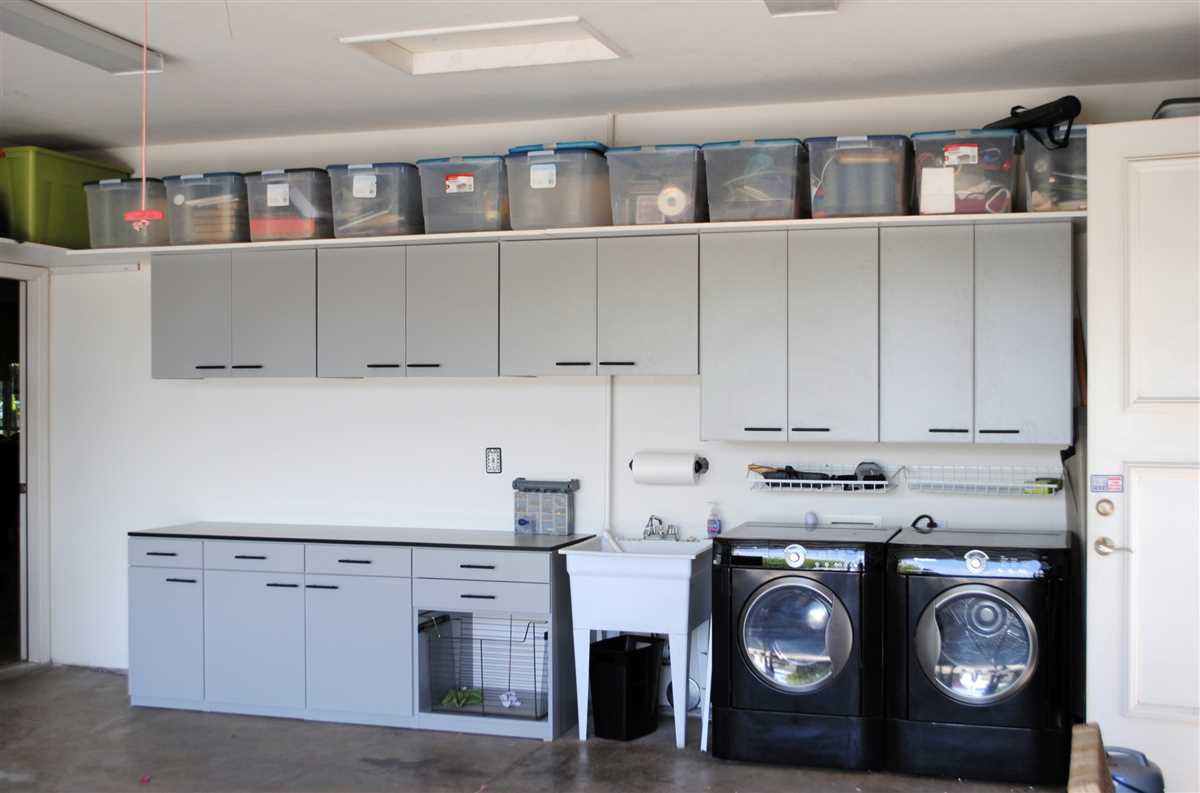
Periodically inspect your washing machine for any signs of wear and tear, such as leaks, unusual noises, or error messages. Address any issues promptly to prevent further damage and costly repairs. Regular inspections also help identify any potential safety hazards.
10. Follow Safety Guidelines
Always follow the safety guidelines provided by the manufacturer when using a washing machine in the garage. This includes avoiding overloading the machine, using the appropriate settings for the fabrics being washed, and keeping children away from the machine during operation.
By following these tips, you can safely install and use a washing machine in your garage and ensure the longevity and efficiency of the appliance.
The Impact of Temperature and Humidity on a Washing Machine in the Garage
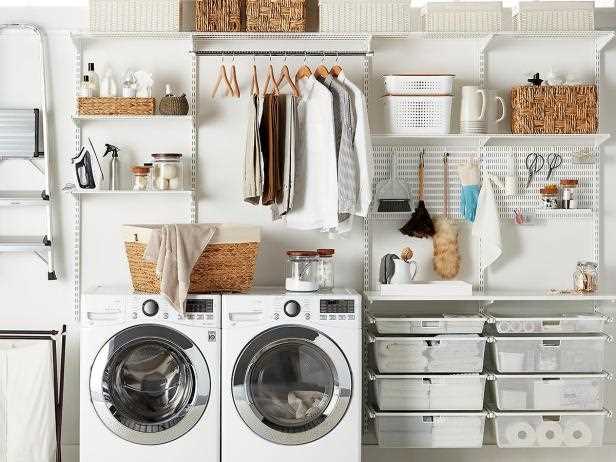
Putting a washing machine in the garage can be a convenient choice for many homeowners. However, it is important to consider the impact that temperature and humidity can have on the performance and lifespan of the appliance.
Temperature
Garages are often subject to extreme temperatures, especially in regions with hot summers and cold winters. These temperature fluctuations can affect the functioning of the washing machine in several ways:
- Deterioration of rubber components: Extreme heat or cold can cause the rubber seals and hoses of the washing machine to deteriorate over time. This can lead to leaks or other malfunctions.
- Reduced efficiency: Cold temperatures can affect the performance of the washing machine, causing it to take longer to complete a cycle or compromising the quality of the wash.
- Potential damage to electronic components: Extreme temperatures can also damage the electronic components of the washing machine, leading to malfunction or even permanent damage.
Humidity
The garage is typically not a well-insulated area, which means it can be prone to high humidity levels. Excessive humidity can have the following effects on a washing machine:
- Mold and mildew growth: High humidity can create a favorable environment for mold and mildew to grow inside the washing machine. This can cause unpleasant odors and even affect the cleanliness of the clothes.
- Corrosion: Moisture in the air can lead to corrosion of metal parts and components of the washing machine, reducing its lifespan and potentially causing malfunctions.
It is important to note that not all washing machines are designed to handle the conditions typically found in a garage. Some models may have specific temperature and humidity requirements, and placing them in a garage can void the warranty or lead to premature failure.
Recommendations
To minimize the negative impact of temperature and humidity on a washing machine in the garage, consider the following recommendations:
- Choose a washing machine model specifically designed for garage use or one that has a wider operating temperature and humidity range.
- If placing a regular washing machine in the garage, ensure that the area is well-insulated and ventilated to manage temperature and humidity levels.
- Protect the washing machine from extreme temperature fluctuations by insulating the water supply lines and using weather-stripping on the garage door.
- Regularly clean and maintain the washing machine to prevent the build-up of mold, mildew, and corrosion.
- If possible, consider alternative indoor locations for the washing machine, such as a utility room or laundry room.
Common Problems and Solutions When Using a Washing Machine in the Garage
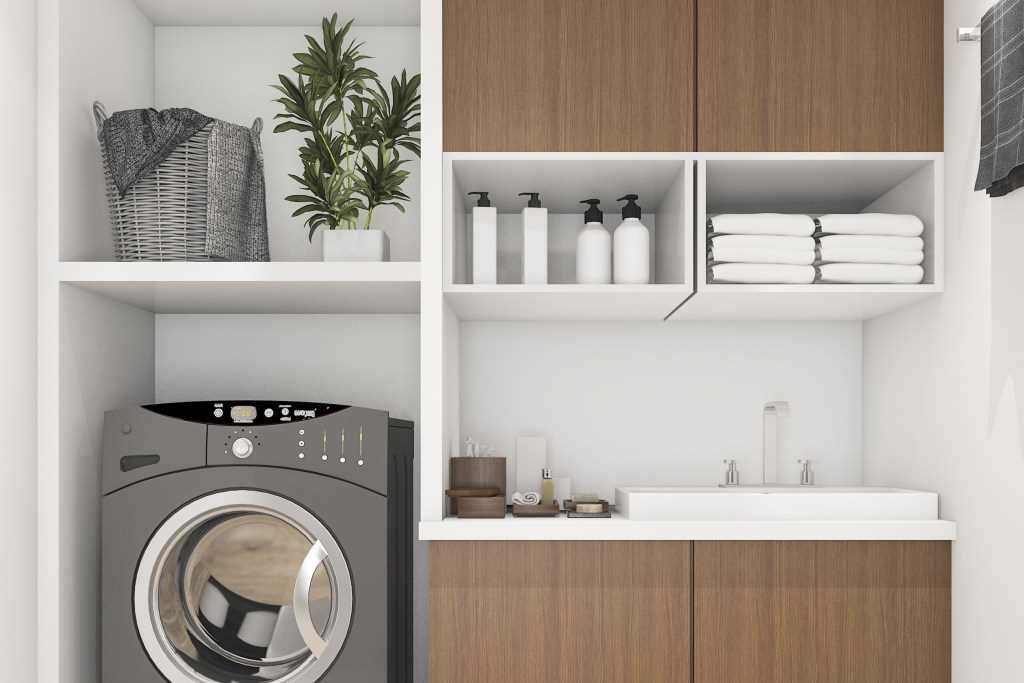
While it is generally safe to put a washing machine in the garage, there are some common problems that can arise from this setup. Here are a few of the most common issues you may encounter and some suggested solutions:
-
Temperature extremes:
Garages can be subject to extreme temperatures, both hot and cold. This can affect the performance and longevity of your washing machine. To combat this, consider insulating the garage or installing a heater or air conditioner to regulate the temperature.
-
Humidity:
Garages often have higher humidity levels compared to the rest of the house. Excessive humidity can lead to mold and mildew growth, which can damage your washing machine and affect the cleanliness of your clothes. To address this, ensure proper ventilation in the garage by using a dehumidifier or opening windows.
-
Dust and dirt:
Garages tend to be dusty and dirty environments, which can lead to clogged filters and other operational issues with your washing machine. Regularly clean the area around the washing machine and consider covering it when not in use to protect it from dust and dirt.
-
Noise and vibration:
Washing machines can generate a significant amount of noise and vibration during operation. This can be amplified in the garage due to the lack of soundproofing. To minimize noise and vibration, place an anti-vibration pad or mat under the washing machine and consider adding additional insulation or soundproofing to the garage walls.
-
Limited space:
Garages often have limited space, which can make it challenging to properly install and access the washing machine. Ensure that the area where you plan to install the washing machine has enough space for proper ventilation and easy access for maintenance and repairs.
By considering these common problems and implementing the suggested solutions, you can ensure a smooth and efficient operation of your washing machine in the garage.
FAQ
What are the safety concerns of placing a washing machine in the garage?
The main safety concerns of placing a washing machine in the garage include potential electrical hazards, exposure to extreme temperatures, and possible water leaks. Garages often have higher humidity levels, which can lead to mold and mildew growth.
Can I install a washing machine in my garage if it gets very hot or cold?
Yes, you can install a washing machine in your garage even if it gets very hot or cold. However, you should take precautions to protect the machine from extreme temperatures. It’s important to ensure that the garage is properly insulated and ventilated to regulate the temperature and prevent damage to the machine.
What should I do to make sure my washing machine is safe in the garage?
To ensure the safety of your washing machine in the garage, you should take several steps. First, make sure the electrical outlets and wiring in the garage are up to code and properly grounded. Second, install a flood sensor and shut-off valve to protect against water leaks. Finally, maintain a moderate temperature and humidity level in the garage to prevent mold and mildew growth.
Are there any specific electrical requirements for installing a washing machine in the garage?
Yes, there are specific electrical requirements for installing a washing machine in the garage. The electrical outlets in the garage should be GFCI (Ground Fault Circuit Interrupter) protected to prevent the risk of electrical shock. It’s recommended to hire a qualified electrician to ensure the proper electrical setup for the washing machine in the garage.
What are some alternative options if I don’t want to put my washing machine in the garage?
If you don’t want to put your washing machine in the garage, there are alternative options available. You can consider installing it in a dedicated laundry room, bathroom, or utility closet. If space is limited, there are also compact washing machine models available that can be placed in smaller areas such as under countertops or in tight corners.
What are the potential dangers of putting a washing machine in the garage?
There are a few potential dangers of putting a washing machine in the garage. First, the garage environment is usually subject to extreme temperatures, which can affect the washing machine’s performance and potentially cause damage. Second, the garage is typically a more dusty and damp environment, which can lead to clogs in the washing machine’s water lines and filters. Finally, if there is not proper ventilation in the garage, the washing machine’s motor can overheat and potentially cause a fire.












